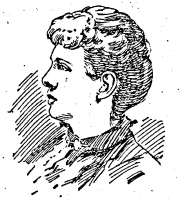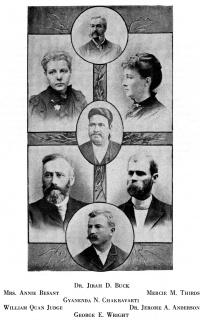Mercie M. Thirds
Mrs. Mercie M. Thirds was a prominent lecturer and writer in the Theosophical Society during the 1890s. She delivered two addresses at the Theosophical Congress in the World's Parliament of Religions in 1893.
Personal Life
Mercianna McMillan was born around 1851 in Canada as the daughter of Thomas and Adelaide McMillan. The family emigrated to Bement in central Illinois in the late 1850s, and then moved to Chicago. When she was 18, Mercy or Mercie worked as a teacher.[1][2][3]
On July 17, 1872 she married James M. Thirds, a Chicago bank clerk. James was the son of William and Charity Thirds, of Kankakee, Illinois.[4] In 1873, Mercie was a teacher at the Scammon School, one of the first public schools buildings erected in Chicago, but she resigned the following year, probably to start a family.[5][6] Married and mothers were rarely allowed to be teachers in that era.
James and Mercie lived in Deerfield, Illinois and in September, 1875 had a daughter Alma Adelaide Thirds.[7] By 1900, Mercie was calling herself a widow. She and James had divorced on the grounds of adultery around 1887, and he had moved to Minneapolis, while she moved to San Francisco and worked as a newspaper writer.[8][9][10]
Alma attended St. Mary's College in Notre Dame, Indiana. One of her poems was published in the affiliated Notre Dame Scholastic.[11] Around 1898, she married Thomas Hancock Davis. They lived in San Francisco and had one child. Alma died on February 14, 1938 in Napa, California[12]
After 1909, Mercie was confined to Southern California State Hospital in San Bernardino, and she died on February 1, 1922.[13] [14]
Theosophical involvement
Mrs. Thirds was admitted as a member of the Theosophical Society on 7 April 1888 in Chicago.[15] She was a prominent lecturer on Theosophy in the 1890s, and served as one of the councilors of the American Section.[16] One lecture tour to Hawai'i evoked this response:
Mrs. Mercie M. Thirds left Honolulu on December 8th, having completed her mission to the Hawaiian Islands. A large farewell meeting was held in the parlors of Mr. M. P. Robinson, and many of the most intelligent people of Honolulu assembled thereat. An orchestra was stationed at one corner of the lanai and a repast was served. As the visitors were leaving, the F.T.S. [Fellows of the Theosophical Society] gathered in the library and presented through Mr. Robinson to Mrs. Thirds a beautiful album of Island views and a cheque. Mrs. Thirds, after her long and valuable work in Honolulu, arrived in good health at San Francisco.[17]
Some of her lectures included "The Seven Principles of Man," "Adepts, or The Masters," "The Way to Wisdom," and "Universal Brotherhood."[18][19][20][21] She spoke in San Francisco, San Jose, San Diego, and Sacramento.
1893 Parliament in Chicago
As an active Chicago Theosophist, Mrs. Thirds was involved in planning for the Theosophical Congress of the 1893 World's Parliament of Religions. In addition to working on the women's host committee, she delivered a lecture on "The Links Between Religion and Science."
1895 Secession and following years
Mrs. Thirds was unhappy that the international convention in Adyar at the end of 1894 voted for William Quan Judge to resign as vice president of the Theosophical Society. No American delegates were present for that vote. She was quote in a San Francisco newspaper:
I do not know what Mr. Judge will do. I cannot see that he has any cause for resigning the vice-presidency. The convention which is reported to have demanded his retirement was not representative of the whole society. I think it will be found to have been merely a convention of the Indian section with some of the Europeans...
The convention of the American section, held in San Francisco last spring, failed to name delegates to the Adyar convention.
But the American convention did not fail to indorse Mr. Judge on that occasion and it will be seen that at the next annual convention, to be held in Boston, he will be still more strongly indorsed.[22]
Judge was indeed supported vigorously in the Boston convention, leading to a situation where virtually all American lodges withdrew from the Adyar parent Society, choosing to form a new organization led by Judge. Mr. Judge had been ill for some time, and he passed away on March 21, 1896. Mrs. Katherine Tingley became the leader of the new organization, called the Universal Brotherhood and Theosophical Society. She led a world-wide crusade to evangelize Theosophy, and Mercie Thirds discussed the matter with eloquent on brotherhood, concluding:
The world has needed a change in its thought, a change in its morals. It is necessary to arouse the ideals of man, to teach him to look up to his higher duty. It is to meet this need, to prepare the way for a grader civilization than the world has ever known, that this crusade has been instituted... And so our crusaders have decided to go forth with a message of good will to all peoples.[23]
Mrs. Thirds continued lecturing on Theosophical topics around San Francisco. She may have joined Theosophists who split off from the Tingley group to form the Theosophical Society in America organized by Ernest Temple Hargrove, with her 1899 lecture "The Master of Compassion" given under that name.[24] Certainly the newspapers were a bit confused about the proliferation of Theosophical groups at that time.
Journalism and writing
Shortly after the Illinois Women's Press Association was formed, Mrs. Thirds became its recording secretary. The group then had over 100 members, whose object was "to promote co-operation between its members and to advance the standard of their work.[25] She had articles published in several newspapers. A travelogue about San Diego was reprinted in Chicago and California dailies. Two of the articles that the Chicago Tribune published in 1888 were "Theosophy in Chicago. Two Societies That Prefer Buddhism to Christianity" and "New Psychic Force Fads. Sensitive Persons May Work Wonders With the Astral Fluid" [on psychometry].[26][27] When living in San Francisco around 1900, she was employed as a newspaper writer.[28]
Poetry was another area of endeavor. She published poems in the sentimental style of the day in a wide range of periodicals such as The Kindergarten, The Pioneer Express (Pembina, North Dakota), and Belford's Annual.
Some of her efforts went into Theosophical publications, including Pacific Theosophist and The New Californian. The Union Index of Theosophical Periodicals lists 14 articles by Mrs. Thirds. If she published any books, none have been identified. She did write "A Theosophical View of Woman" that was issued as Branch Paper No. 21 of the American Section.
Notes
- ↑ U. S. Federal Census, 1870.
- ↑ "Mercianna McMillan" Hale and Watson Ancestors website. Accessed 12/29/2023.
- ↑ Note: The year of birth has been variously given as 1852, 1851, and 1855 (in 1900 U. S. Federal Census).
- ↑ U. S. Federal Census, 1860.
- ↑ "Scammon School" Chicago Post (June 28, 1873), 47.
- ↑ "Official Report, Regular Meeting of Board of Education Chicago 10, 1874." Daily Inter Ocean 2.304 (March 11, 1874), 5.
- ↑ U. S. Federal Census, 1880.
- ↑ U. S. Federal Census, 1900.
- ↑ "Mercianna McMillan" Hale and Watson Ancestors website. Accessed 12/29/2023.
- ↑ "Extremely Rare Old Checks - 2" posted February 12, 2012 at Old American Checks - My Collection Wordpress blog. An attorney named W. K. Barton handled the divorce, and left papers that were quoted by the blogger. Mercie Thirds asked James to support their daughter.
- ↑ Alma Thirds. "The Frost Had Fallen There" Notre Dame Scholastic 25 no. 35 (May 7, 1892): 593.
- ↑ "Alma Adelaide Thirds" Hale and Watson Ancestors website. Accessed 12/29/2023.
- ↑ U.S. City Directories, 1822-1995.
- ↑ California Death Index, 1905-1939.
- ↑ Theosophical Society General Membership Register, 1875-1942 at http://tsmembers.org/. See book 1, entry 4421 (website file: 1B/40).
- ↑ "Still Secretary: Theosophists will retain W. Q. Judge" San Francisco Call Bulletin (April 24, 1894): 4.
- ↑ “The Mirror of the Movement” The Path 9.11 (February, 1895) 407.
- ↑ "Theosophy" Sacramento Daily Union" 82 (December 5, 1891): 4.
- ↑ "Theosophy" Sacramento Daily Union" 82 (October 24, 1891): 9.
- ↑ "The Theosophical Society" San Francisco Chronicle (March 6, 1892): 18.
- ↑ "Universal Brotherhood" [San Jose] Evening News 20 no.63 (October 19, 1891): 3.
- ↑ "Local Criticism of a Mystic Body: Mercie M. Thirds' View of the Theosophical Convention in India: Stands Firmly with Judge" San Francisco Call Bulletin77 (February 16, 1895): 6.
- ↑ "Theosophists Go Touring" San Francisco Chronicle (August 3,1896): 12.
- ↑ "Meetings - Universal Brotherhood" San Francisco Call Bulletin 86 (July 16, 1899): 86.
- ↑ "The Illinois Women's Press" Daily Inter Ocean 17.326 (February 13, 1889), 3.
- ↑ Mercie M. Thirds, "Theosophy in Chicago. Two Societies That Prefer Buddhism to Christianity" Chicago Tribune (December 25, 1888), 11.
- ↑ Mercie M. Thirds, “New Psychic Force Fads. Sensitive Persons May Work Wonders With the Astral Fluid." Chicago Tribune (December 16, 1888), 25.
- ↑ U. S. Census, 1900.
[[Category:Nationality Canadian|Thirds, Mercie]

